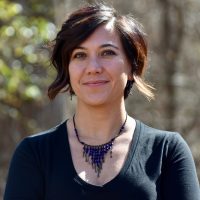Sharing breast milk is increasingly common, but its impact on infant nutrition is understudied
September 4, 2019
Though many families worldwide turn to various methods of human milk exchange to feed and nourish their infants, researchers have done little to explore the impact of sharing breast milk on infant health outcomes and malnutrition, according to a paper led by faculty at the UNC Gillings School of Global Public Health.
This important finding from the first-ever review of scholarly literature on human milk exchange offers the ‘state-of-the-science’ on human milk exchange to improve patient education and parents’ informed decision making, as well as important areas for further research on the topic. Human milk exchange includes human milk banking, human milk sharing and emerging markets in which human milk may be purchased or sold.

Dr. Aunchalee Palmquist
Aunchalee Palmquist, PhD, IBCLC, assistant professor of maternal and child health at the Gillings School, is lead author of “Current Trends in Research on Human Milk Exchange for Infant Feeding,” which was published online June 17 by the Journal of Human Lactation. Palmquist also is a member of the Gillings School’s Carolina Global Breastfeeding Institute.
“We have virtually no science related to how human milk sharing effects the growth, immunological function or neurological development of infants,” Palmquist says. “There are also gaps in our understanding of sociocultural, historical and political economic dimensions of human milk banking and milk sharing both in the United States and internationally.”
The World Health Organization recommends that infants receive breast milk exclusively from birth to six months of age and continue nursing, with the addition of solid foods, to two or more years of age. In situations where a mother’s milk requires supplementation or is unavailable, many parents may turn to milk banking or milk sharing, which they may find preferable to formula feeding. Due to the potential risks of sharing unpasteurized human milk, the American Academy of Pediatrics and the Academy of Breastfeeding Medicine recommend that donor milk be pasteurized and obtained from a milk bank, as this is the safest source of donor milk.
Many parents face barriers, however, in accessing pasteurized donor human for their baby — or they may simply wish to rely on their family, friend and community networks so that banked milk can be prioritized to preterm and medically fragile infants, says Palmquist.
“Many parents want their baby to receive the immunological support and other health benefits of human milk, and they also turn to milk sharing when their baby has an adverse reaction to formula feeding or their baby is not thriving on formula,” she says. “Mothers who have received milk from others also say that milk sharing relationships provide psychosocial support during their often difficult infant feeding journeys.”
Palmquist says the most common way milk is exchanged is through unpaid gifts of expressed milk from one mother to another.
“For example, a mother may be pumping milk for her own baby and end up with a large surplus of milk in her freezer,” she explains. “She may meet another mother who is struggling with breastfeeding or making enough milk to keep up with her baby’s needs, and the first mother offers to share some of her frozen milk.” In these circumstances, parents often will ask for health records and other information about diet, medications and pumping practices to mitigate the risks.
In their review, Palmquist and her team revealed a significant gap in information on the short- and long-term effects of human milk sharing practices on lactation and infant outcomes, and they stress the need for more research on the potential contribution of donor human milk in the treatment of acute malnutrition in young infants. Parents and health care providers will benefit from data that enable them to evaluate the risks, costs and benefits of different methods of human milk exchange for more informed decisions that work for individual families.
Contact the Gillings School of Global Public Health communications team at sphcomm@unc.edu.
